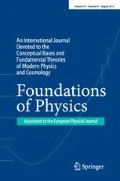Abstract
Recently Cator and Landsman made a comparison between Bell’s Theorem and Conway and Kochen’s Strong Free Will Theorem. Their overall conclusion was that the latter is stronger in that it uses fewer assumptions, but also that it has two shortcomings. Firstly, no experimental test of the Conway–Kochen Theorem has been performed thus far, and, secondly, because the Conway–Kochen Theorem is strongly connected to the Kochen–Specker Theorem it may be susceptible to the finite precision loophole of Meyer, Kent and Clifton. In this paper I show that the finite precision loophole does not apply to the Conway–Kochen Theorem.
Similar content being viewed by others
Notes
This way of introducing hidden variable states is perhaps somewhat cumbersome, but it will be helpful for seeing the analogy with the Conway–Kochen Theorem in the next section.
In three dimensions Conway and Kochen hold the record for the smallest number of vectors (31) [35, p. 114]. The constructions of Peres [35, p. 198] and Bub [11] both use 33 vectors of which the latter requires the least number of frames of all these results. Recently, the number of contexts has been minimized to 7 for the Hilbert space \(\mathbb {C}^6\) [32]. For more discussion on comparing sizes of Kochen–Specker sets see [9, 34] and references therein.
References
Abbott, A.A., Calude, C.S., Svozil, K.: Strong Kochen–Specker theorem and incomputability of quantum randomness. Phys. Rev. A 89(3), 032109 (2014)
Abbott, A.A., et al.: Strong Kochen–Specker theorem and incomputability of quantum randomness. Phys. Rev. A 86(6), 062109 (2012)
Appleby, D.M.: The Bell–Kochen–Specker theorem. Stud. Hist. Philos. Mod. Phys. 36, 1–28 (2005)
Atkinson, D.: Bell’s inequalities and Kolmogorov’s axioms. Pramana 56(1–2), 139–152 (2001)
Barrett, L., Kent, A.: Non-contextuality, finite precision measurement and the Kochen–Specker theorem. Stud. Hist. Philos. Mod. Phys. 35, 151–176 (2004)
Bell, J.S.: On the Einstein Podolsky Rosen Paradox. Physics 1(3), 195–200 (1964)
Bell, J.S.: On the problem of hidden variables in quantum mechanics. Rev. Mod. Phys. 38(3) (1966), Reprinted in [8], pp. 447–452
Bell, J.S.: Speakable and Unspeakable in Quantum Mechanics. Cambridge University Press, Cambridge (1987)
Bengtsson, I.: Gleason, Kochen–Specker, and a competition that never was. AIP Conf. Proc. 1508(1), 125–135 (2012)
Brown, H.R., Svetlichny, G.: Nonlocality and Gleason’s lemma. Part 1. Deterministic theories. Found. Phys. 20(11), 1379–1387 (1990)
Bub, J.: Schütte’s tautology and the Kochen–Specker theorem. Found. Phys. 26(6), 787–806 (1996)
Cabello, Adán: Finite-precision measurement does not nullify the Kochen–Specker theorem. Phys. Rev. A 65(5), 052101 (2002)
Cator, E., Landsman, N.P.: Constraints on determinism: Bell versus Conway–Kochen. arXiv preprint. quant-ph/1402.1972 (2014)
Clauser, J.F., et al.: Proposed experiment to test local hidden-variable theories. Phys. Rev. Lett. 23(15), 880–884 (1969)
Clifton, R.: Getting contextual and nonlocal elements of reality the easy way. Am. J. Phys. 61(5), 443–447 (1993)
Clifton, R., Kent, A.: Simulating quantum mechanics by non-contextual hidden variables. Proc. Math. Phys. Eng. Sci. 456(2001), 2101–2114 (2001)
Conway, J.H., Kochen, S.: The free will theorem. Found. Phys. 36(10), 1441–1473 (2006)
Conway, J.H., Kochen, S.: The strong free will theorem. Not. AMS 56(2), 226–232 (2009)
Fine, A.: Hidden variables, joint probability, and the Bell inequalities. Phys. Rev. Lett. 48(5), 291–295 (1982)
Fine, A.: Joint distributions, quantum correlations, and commuting observables. J. Math. Phys. 23, 1306–1310 (1982)
Goldstein, S., et al.: What does the free will theorem actually prove? Not. AMS 57, 1451–1453 (2010)
Griffiths, R.B.: Hilbert space quantum mechanics is noncontextual. Stud. Hist. Philos. Sci. B 44(3), 174–181 (2013)
Held, C.: The Kochen–Specker Theorem. The Stanford Encyclopedia of Philosophy. Zalta, E. N. (ed). Spring 2013 (2013)
Hermens, R.: Quantum mechanics: from realism to intuitionism. arXiv preprint. quant-ph/1002.1410 (2010)
Hermens, R.: The problem of contextuality and the impossibility of experimental meta-physics thereof. Stud. Hist. Philos. Sci. B 42(4), 214–225 (2011)
Heywood, P., Redhead, M.L.G.: Nonlocality and the Kochen–Specker paradox. Found. Phys. 13(5), 481–499 (1983)
Hooker, C.A. (ed.): The Logico-Algebraic Approach to Quantum Mechanics Volume I. D. Reidel, Dordrecht (1975)
Jones, R.T., Adelberger, E.G.: Quantum mechanics and Bell’s inequalities. Phys. Rev. Lett. 72(17), 2675–2677 (1994)
Kent, A.: Noncontextual hidden variables and physical measurements. Phys. Rev. Lett. 83(19), 3755–3757 (1999)
Khrennikov, A.: Nonlocality as well as rejection of realism are only sufficient (but non-necessary!) conditions for violation of Bell’s inequality. Inf. Sci. 179, 492–504 (2009)
Kochen, S., Specker, E. P: The problem of hidden variables in quantum mechanics. J. Math. Mech. 17, 59–67 (1967). Reprinted in [27], pp. 293–328
Lisoněk, P., et al.: Kochen–Specker set with seven contexts. Phys. Rev. A 89(4), 042101 (2014)
Meyer, D.A.: Finite precision measurement nullifies the Kochen–Specker theorem. Phys. Rev. Lett. 83(19), 3751–3754 (1999)
Pavičić, M., et al.: Kochen–Specker vectors. J. Phys. A 38(7), 1577–1592 (2005)
Peres, A.: Quantum Theory: Concepts and Methods. Kluwer Academic, New York (2002)
Santos, E.: Does quantum mechanics violate the Bell inequalities? Phys. Rev. Lett. 66(11), 1388–1390 (1991)
Shimony, A.: Contextual hidden variables theories and Bell’s inequalities. Br. J. Philos. Sci. 35(1), 25–45 (1984)
Smolin, L.: Three Roads to Quantum Gravity. Weidenfeld & Nicolson, London (2000)
Stairs, A.: Quantum logic, realism, and value definiteness. Philos. Sci. 50, 578–602 (1983)
Svetlichny, G., et al.: Do the Bell inequalities require the existence of joint probability distributions? Philos. Sci. 55(3), 387–401 (1988)
Wigner, E.P.: Die Messung quantenmechanischer Operatoren. Z. Phys. 133, 101–108 (1952)
Acknowledgments
I would like to thank N. P. Landsman for encouraging comments on an early sketch of this paper. This work was supported by the NWO (Vidi Project nr. 016.114.354).
Author information
Authors and Affiliations
Corresponding author
Rights and permissions
About this article
Cite this article
Hermens, R. Conway–Kochen and the Finite Precision Loophole. Found Phys 44, 1038–1048 (2014). https://doi.org/10.1007/s10701-014-9827-8
Received:
Accepted:
Published:
Issue Date:
DOI: https://doi.org/10.1007/s10701-014-9827-8




